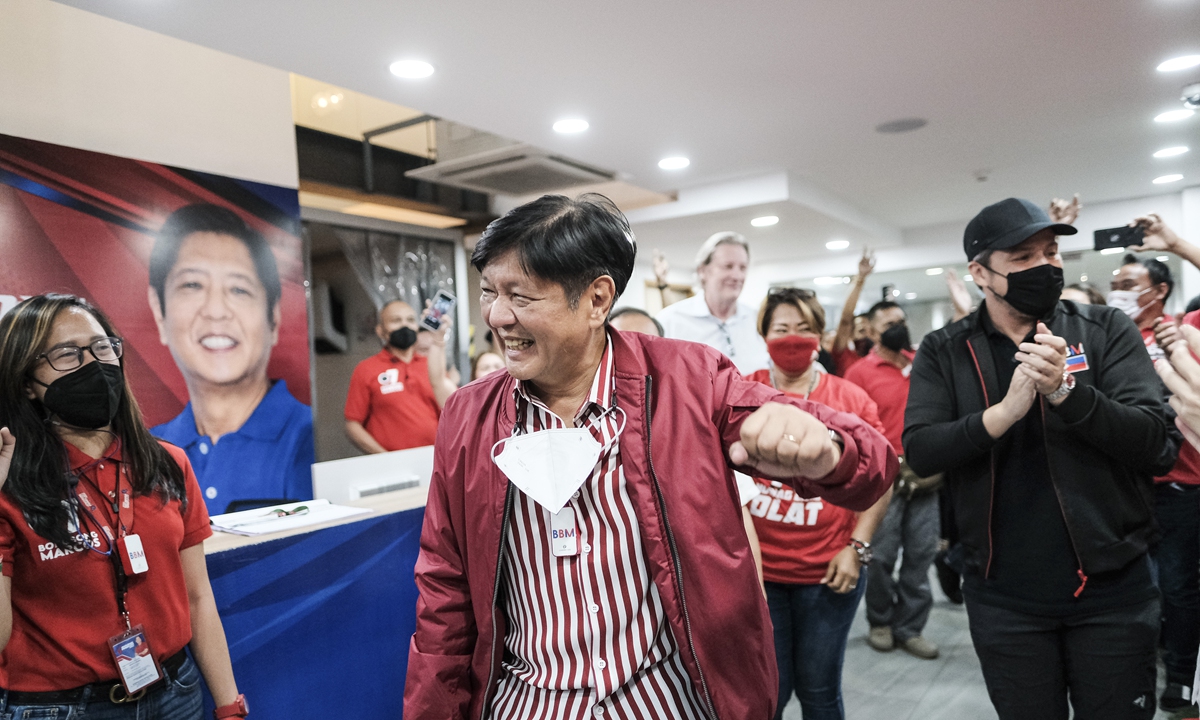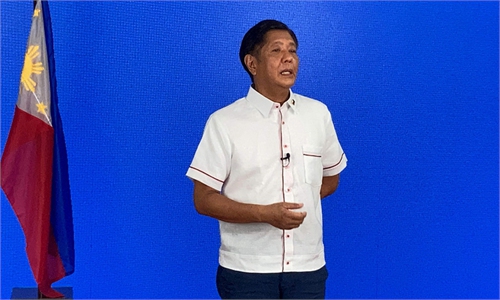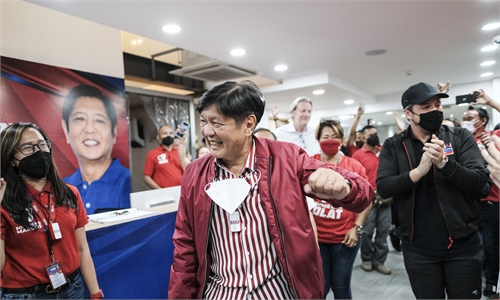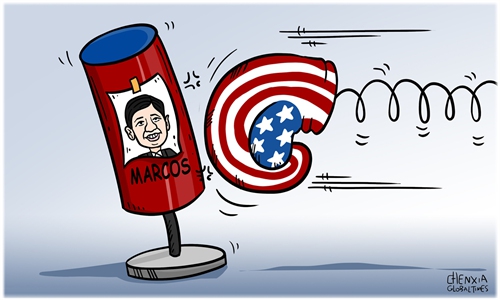China, Philippines to further enhance economic cooperation; S. China Sea issue 'will not affect bilateral ties'

Ferdinand Marcos Jr., Philippines presidential candidate, arrives at his campaign headquarters in Mandaluyong City, Manila, the Philippines, on Monday, May 9, 2022.Photo: VCG
China and the Philippines celebrated the 47th anniversary of the establishment of bilateral relations and 21st China-Philippines Friendship Day on Thursday, just days before Philippine president-elect Ferdinand Marcos Jr. takes office. Chinese analysts said that bilateral ties will be further strengthened under the pragmatic China policy of Marcos Jr. who is believed not to let the South China Sea issue affect the overall development of ties.
But analysts warned that as the US increasingly views Southeast Asia as an important part of its "Indo-Pacific Strategy," the US will intensify its efforts to rope in Marcos Jr. due to the geopolitical value of the Philippines, which is the US' most important ally in Southeast Asia and only ally in the South China Sea region.
Chinese Ambassador to the Philippines Huang Xilian said on Wednesday at a celebration of the 21st China-Philippine Friendship Day that both China and the Philippines are at a critical stage of development and bilateral relations are facing important opportunities and broad prospects.
Huang said it is all the more important for the two countries to work together to meet challenges, focus on peace and development and achieve win-win cooperation.
Marcos Jr. who will succeed Rodrigo Duterte on June 30, said at the celebration that he looked forward to more years of friendship with China.
The centuries-old friendship between the Philippines and China has been and will continue to be of great mutual benefit to our people, Marcos said, according to Xinhua News Agency.
The Philippines and China established diplomatic relations on June 9, 1975.
The future cooperation between China and the Philippines will continue a relatively stable growth trend in areas including trade and investment, agricultural modernization, digital economy, infrastructure development and offshore oil and gas development, Chen Xiangmiao, an assistant research fellow at the National Institute for South China Sea Studies, told the Global Times on Thursday.
Among them, infrastructure cooperation will be the key and a significant element in further improving bilateral ties, considering the Philippine need and the enthusiasm of Marcos Jr.'s father for infrastructure construction during his presidency, Chen said.
However, China-Philippine relations face challenges of the US' growing pressure as well as the South China Sea disputes, analysts said.
The South China Sea issue remains the biggest challenge in China-Philippine relations, Chen said, but Marcos Jr. will not overemphasize the issue in handling bilateral relations, nor will use it as coercion to bargain with China.
Li Kaisheng, deputy director at the Institute of International Relations of the Shanghai Academy of Social Sciences, told the Global Times on Thursday that Marcos Jr. will also have to pursue a balancing policy between China and the US and will not take sides although it is an ally of the US. But the US' increased pressure on the Philippines is another major challenge for China-Philippine relations, Li noted.
The US is speeding up with its "Indo-Pacific Strategy" in Southeast Asia to contain China, and it expects Marcos to play a more important role than Duterte in its "Indo-Pacific Strategy," Li said.
The US will intensify its efforts to pressure and lure the new government of the Philippines and is likely to take advantage of its alliance with the Philippines and even manipulate domestic opinion of the Philippines to pressure the new government.
When China and the Philippines were celebrating their anniversary, US deputy secretary of state Wendy Sherman visited the country on Thursday after US President Joe Biden hosted ASEAN leaders in Washington in May.
Sherman tweeted after she met Marcos Jr. on Thursday that "we discussed strengthening our longstanding alliance, expanding people-to-people ties, deepening our economic relationship, advancing human rights, and preserving a free and open Indo-Pacific."
Sherman's Manila visit was part of her 10-day Asian trip that would bring her to South Korea, Vietnam, and Laos. The US State Department said Sherman's visit to the region "reflects the United States' continued commitment to the Indo-Pacific."
Chen warned that militarily, the US is likely to further hype the maritime disputes between China and the Philippines to offer the Philippine military equipment and training in order to expand its military presence in the region and monitor China in the South China Sea.
Washington has never treated Manila with sincerity or cared about the interests of local people, analysts said, noting the Philippines and other regional countries will refuse to be a tool of the US to contain China.




